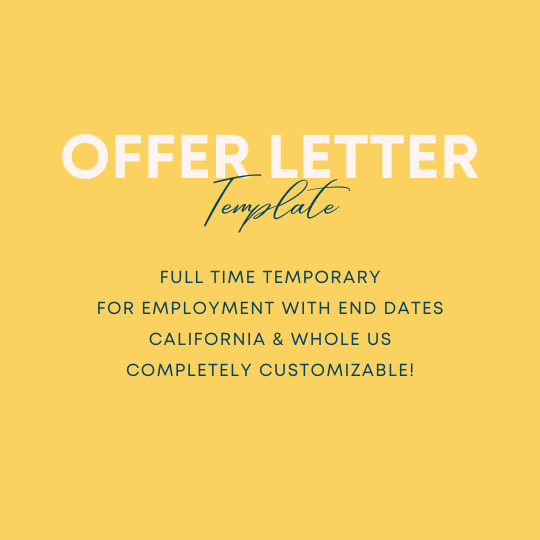20 Job Offer Mistakes Employers and Startups Make with Candidates
I’m getting close to 18 years experience in Recruiting and HR. Reflecting back, I’ve worked in all types of environments and company sizes. Recruitment agencies, an agency of one (consulting), game studios, media and advertising agencies, a design studio, tech giants, start-ups, deep-learning, healthcare… The biggest bulk of my career has been in the San Francisco Bay Area, but I’ve also worked and lived in Seattle and even Toronto, Ontario, Canada.
Now working as a Coach, reflecting back seems to be the MO these days. What can I extrapolate from the past to help others push themselves and their businesses forward?
In this piece, I’ve focused on job offer mistakes that startups and small businesses often make with candidates. Although the focus is mostly on startups, 75% of this can be translated over to all businesses. These are the 20 most common job offer mistakes I’ve encountered startups making with candidate’s over the years.
Not giving enough information.
A job offer should always be presented after a phone/video call. Once presented, it should include a benefits overview, and a detailed job offer letter with whom the person will be reporting onto, their job title, compensation details, when they’ll be starting (+ ending if it’s temporary) and where they’ll be working.
In today’s work world, it may benefit to have a small 1-2 sentence statement on the remote/hybrid nature of your workforce if that’s applicable. In addition, the candidate should be able to review the job description and the career’s page, so don’t be eager to pull this information down. It also sends the signal that the role is filled, and it’s not filled until the candidate has accepted your job offer.
Short job offer expiration deadline.
Candidate’s need a little time to evaluate and reflect on their decision with your job offer, and rushing them to make a decision that day or by the next morning can simply cause them to go in another direction. Provide candidates with the time necessary to come your way.
Long job offer expiration deadline, or none.
On the other hand, too much time with a job offer can also cause candidates to interview and stack job offers. If there’s no deadline, what’s the incentive to get back to the job offer in hand? There’s no threat of loss in their eyes, so the risk is low to explore other opportunities. It’s perfectly acceptable to extend a deadline. Having one forces a touchpoint and a conversation in which you can ask questions and know where you stand up against the candidate’s other considerations.
The natural question then is, what’s the right amount of time for the initial deadline? For a role below Director, I recommend around 4-5 days. For leaders, you’ll feel it out based on the conversations you’ll have about their notice periods etc.
Being rigid and inflexible with the job offer.
There’s nothing more deflating in the job offer negotiation process than when a candidate asks for something reasonable, and the employer has no room to budge. Now, there’s often more context. One example is, the employer offered their “top offer”, stretching the budget to begin with.
There may be other creative ways to offer enticing pieces to the job offer upon a counter negotiation of a top offer… such as… An offering for the candidate to go to a conference, providing more vacation time or PTO, or setting a specific date in the future for a review of their performance for a potential raise (add it in the offer letter). Also, a sign-on bonus is a great way to incentivize a candidate. You can tie a retention piece to employment, ensuring that the employee has to stay with the company for X amount of time or pay the bonus back. A sign-on bonus doesn’t compound for annual raises and it’s a one-time incentive. This can help keep internal equity within bands and keep your overall comp bands from raising if it’s a one-off situation.
Missing essential pieces of the interview process: i.e. switching managers/ not including them.
Employers can often get caught up in the power dynamic of being the ones offering the job offer, and this can cause a whole slew of messiness in the interview and job offer process. Neglecting the importance of someone’s manager is a big one. “They’re on vacation this week” or “your manager starts in two weeks” are very common sentiments. Stop and think for a moment if you would accept a job without meeting your manager, or ask yourself what the risk to retention is if the subordinate and manager have different work values.
Lengthy assignments, presentations, take-homes, case studies, etc.
Time is everything when you’re running through the interview process. Every single day is a day on the clock you’re competing against all the other companies that need that talent too. This statement may seem extreme, and prior to 2020, you may have been right to think so. The recruitment world is ever evolving and every day counts. The days of assigning 8-hour assignments to candidates are gone-zo.
You may be thinking “yeah, but we’re at the job offer stage, so why are we talking about assignments as they’re already being extended a job offer?” I’ll tell you why; Because (1) it’s all part of the encompassing candidate experience, and yes, candidates are interviewing and reviewing you too…and (2) you’ll need to save those days on the front end of the process so you’ll have them at the offer stage. That’s how extreme timing is now. It ALL adds up!
Excessive interviewing and enormous interview panels and teams.
In the same respect as the prior point, you’re doing a disservice to your (1) candidate experience, and (2) the time needed not to lose candidates to other opportunities when you have enormous interview teams.
The other two added aspects here that accumulate four total wrongdoings are (3) you’re taking more team members than necessary away from project work. That can often cause interview exhaustion. Especially because (4) the more interviewers there are, the less likely a candidate will make it through an interview process. That’s not effective hiring. That’s just statistics. When you add more people to the interviewing process, eventually, there will be a “no” in the room.
I’ve seen one “no” drag down a room of 6 or 8 “yes” interviewers more times than I can count, when realistically that person could absolutely do the job. When there are more of these instances, then there are more interviews, with more excessive panels and teams. The cycle of interview exhaustion continues and takes a while to dig out of. The easiest way out of this is to limit the number of interviewers, and stick to it.
Not meeting candidates' basic needs.
The old-school way of thinking about a job is that people went to work and expected work to pay them and give them health insurance (if in the US), and a pension/retirement or a 401k, and life outside of work was completely separate.
That’s not the way employees feel now. Employees want to feel that their employer cares about them. Employees want to feel a sense of community and belonging, a mission (or a few). They want to see programs they can join and benefits that support them throughout whatever stage of their life they’re in right now.
In your 20’s through 40’s? Tuition reimbursement. In your 30’s and 40’s? Family building and management support. In your 30’s and beyond? 401k offerings (although all should care IMO). How will they grow in their role, both laterally and upwards? Now that a lot of work is remote or hybrid, there’s even more of an expectation for employers to support the wellness of their employees. They’ve let you into their homes after all! Candidates want to see this piece and feel that it’s present. If it’s lacking, you won’t have the competitive edge in your job offer.
Not treating referrals with extra TLC.
Referrals often feel like they’re already a part of your community. Like they have one foot in the door because they’ve already had the hard sell at the BBQ last weekend by someone they trust.
If a referral hasn’t had a positive candidate experience, they’ll be less likely to accept the job offer, and even feel personally burned. If you don’t treat them with extra TLC, when they’re a referral from a supposed valued employee, how do you treat other candidates, or how will you treat them in a couple years from now when they aren’t shiny and new anymore?
Yet, going a little above and beyond with a referral and they’ll be a lot more likely to accept the job offer. Don’t be afraid to engage the referrer in the job offer stage to help close the candidate. If they’re getting a referral bonus, they’ll be eager to earn the bonus and help with the final stages of recruiting their friend.
Lacking diversity in the hiring process.
Diversity tends to be one of those things that startups put off and think that they’ll get to later. “We just need to hire now and hire quickly.” There are a few problems with this.
First, it becomes very difficult to dig out of a diversity problem. People want to see people that look like them, and it doesn’t take long for this to spiral out of control. Not caring sends the wrong message to everyone, because it’s also making the assumption that the non-diverse groups aren’t noticing, and don’t care.
When you do make a job offer to a diverse candidate after neglecting diversity, they’ve often noticed that no one resembled them throughout the interview process. Companies can tend to have a sense of desperation when they finally focus on diverse hiring after not initially building into their culture. The biggest loss is that diverse teams outperform those that are not, and this is likely not lost on candidates when evaluating a job offer.
Not being available to answer questions.
Given a job offer, then either being too busy to answer questions or not providing an alternate contact before going on vacation can be catastrophic. If a candidate is asking questions, it’s because they’re engaged in your opportunity and potentially interested. Not having those questions answered in a timely manner means they’ll be left with evaluating their options with the information they have.
Being too available on nights and weekends.
Although we want to be available for candidates, they’re evaluating all the subtleties in the interview process, the same way the employer is evaluating them. The devil is in the details, and sometimes those details are in what we’re not saying.
Of course, answering an email during off hours shouldn’t be judged negatively and is usually met with gratitude. If there’s an emergent situation with visas or immigration, or something is out of the ordinary, then that requires extra attention. That’s not what we’re talking about here.
What could be noticed negatively is if all emails sent to the candidate are late in the evening or on weekends. Ya know… Communications that typically would be answered during business hours and they always come in during wonky times. They’ll be wondering if that’s the norm for all employees. If it is, lean into this and tell candidates up front, and do be ok with a higher turnover rate as that will be inevitable.
Putting too much emphasis on shares and options over salary.
I know someone that was employee number five at a startup that was acquired by a major FAANG tech giant. They weren’t a founder, but had a solid amount of options. That acquisition resulted in a shares payout of what would equate to a nice down-payment on a Bay Area home. So, not anything horrible, and a lot of people would be grateful for that money, but it’s not the “I was employee #5 at Facebook” story. Those are very rare.
I also worked at another startup where the leaders would be personally offended when a candidate would want to shift the options back to the company for a little more annual compensation during a job offer negotiation. That start-up has had at least eight rounds of layoffs in which those former employees were faced with the decision of purchasing their options as unemployed individuals. If those options were purchased and the startup fails, the laid-off employees end up actually in the hole. If not purchased, the options go back to the company.
By the time tech workers start to get into their 30’s and 40’s, they’ve either first-hand experienced, or heard enough stories like this to want a more even distribution of shares vs salary. Employees at startups still want to be invested and ride the ride, but just need a little more forgiveness for wanting more salary over options.
You put little/no compensation strategy into the job offer.
When a startup is really green and lean, it’s really easy to get caught up in speed and using what’s worked in the past when in fact, the market may be shifting and changing. Using internal compensation data to benchmark what’s in a job offer is only one piece of the puzzle. Understanding the market’s shifting supply and demand and how that can even shift as quickly as month to month matters. Using compensation tools (non-google-able ones) is essential in evaluating the ups and downs that change rapidly.
You expect candidates to treat you like you’re Google.
A lot of the prior actions are based on the painful point that all companies aspire to be the next big thing in their space. Until a startup reaches that level, it can’t compare the lengthy interview process to a place like a Google, because candidate’s are more willing to jump through hoops for a place like that.
Startups can’t afford to be non-responsive. Google can drop off for a week and come back and candidates will likely still be interested to hear what they have to say. We always look to these tech giants to see what innovative things they’re doing. We want to include their innovation in our companies, and that doesn’t stop at their products. It goes as far as wanting to mimic their hiring practices. Google does some pretty awesome stuff, like cross-functional interviewers from different teams for the cultural interview to make sure we don’t have homogeneous teams. Pretty cool idea! What we don’t want to get caught up in is the idea that we need to think of ourselves like a Google in order to eventually get there. If I had a dollar for every time someone said to me “They didn’t seem interested enough in the position”...On goodness…On that note…
You didn’t sell enough, and expected candidates to be sold.
It’s the Recruiter’s job to help sell the company, but they need the team to really run that home when they pass the candidate over. Only the team and the manager know the intricacies of the day to day and the juicy and exciting pieces of the job.
Of course we need to interview and get what we need from the candidate, but we can’t forget to sell. This isn’t hard to do. Just spend quality time at the beginning and end of the interview on what we can provide to them. The middle is where we get what we need from them. Whatever you do, always make time for the candidate to ask questions. That’s absolutely essential. If they didn’t get their questions answered by the team during the interview process, it won’t matter come the job offer time.
You weren’t genuine, and the candidates can tell.
Candidate’s want to know that they can ask tough questions. They want real answers. If the answers to all of their questions are full of fluff and rainbows, they’ll sense BS.
People want to work with people. Humans! How will they be able to push the product forward and remove roadblocks if they can’t have an honest dialogue? The interview process is often short and there’s usually not time to delve really deep into “the feels” and that’s ok. Most people are looking for something more subtle in the interview process as a foreshadowing of what could come. Candidate’s are really just looking for the signs that they won’t feel stuck. That they can have a good flow of communication.
You expected miracles from your Recruiters and provided little/no support.
Let’s provide a comparison scenario where you receive two Linkedin Inmails for job opportunities for comparable jobs. One is from a Recruiter. The other is from the head of the department. Which one carries more weight in your eyes? Which are you more likely to respond to? Now, flip that and imagine you’re on the side that’s recruiting.
A truly successful recruitment function is a partnership between the recruiter and the department and job they’re supporting. The recruiter is the project manager responsible for pushing the hiring of candidates forward. Project Managers need a team to execute on the project. The project at hand just happens to be hiring in this case.
Not trusting your Recruiters.
Since your Recruiters are your Project Managers and Subject Matter Experts (SMEs) in recruitment, trust them. If they say their Applicant Tracking Software is causing them to miss essential communications or workflows, trust them. If they say “I got this” step aside and let them get it.
Partnerships are essential to hiring, especially in the job offer stage. However, don’t underestimate that your recruiters are SMEs and have been managing the process with the candidates from the start. It’s their job to read people and to read the situation based on prior experiences. Executives (especially at startups) often like to own the job offer presentation step. If you’re an executive that likes to own presenting job offers, I encourage you to do this with your recruiter as a partnership as they know how to position your benefits the best and they aren’t surprised by the shifting personalities that come out of people during job offer negotiations.
Lastly, don’t underestimate the value of neutrality that your recruiter brings to the table. An internal recruiter is the messenger between the candidate and the decision makers. This provides a little space for both parties to think vs having to decide on-the-spot during job offer negotiations. Plus, neutrality has its benefits in providing ease to the candidates. When I’ve needed to break down a wall with a candidate, I can always rely on the sentiment that I want this job offer to work out. We’ve come a long way and I also don’t want to backfill this role in the near future.
You’ve hired your Recruiters because they’re SMEs. Let them lead the hiring space and let them tell you when they need you. A good Recruiter knows when to solicit support and when to own the process themselves.
You don’t know when to let go.
We can’t win them all. That’s ok. Startups are more guilty of not letting go of a job offer than midsize to large companies because the time investment on the team to find the candidate and interview was much more. Whatever you do, don’t provide an open-ended job offer. Let go for now, and revisit the prospect later.
My hunch is that if you’re a small company or a startup, you’ll likely need to improve upon at least a few of the above points, and that’s ok. It takes time and learning to get it right. We never get it all right all the time anyway and we all make job offer mistakes. What matters most is caring and being thoughtful, and not putting everything off until later. If you’re thoughtful and provide a good experience, set a calendar reminder (or one in your ATS) to check in with that candidate in 6 months. Even if you’re not hiring then, when you are someday, they’ll remember that you checked in with them. People ultimately want to feel special, and that’s what this is all about.
Looking for Job Offer Letter Templates?
Download all 4 templates in under 3 min!
Perfect for your startup! Covers all legal necessities in California and the US.







